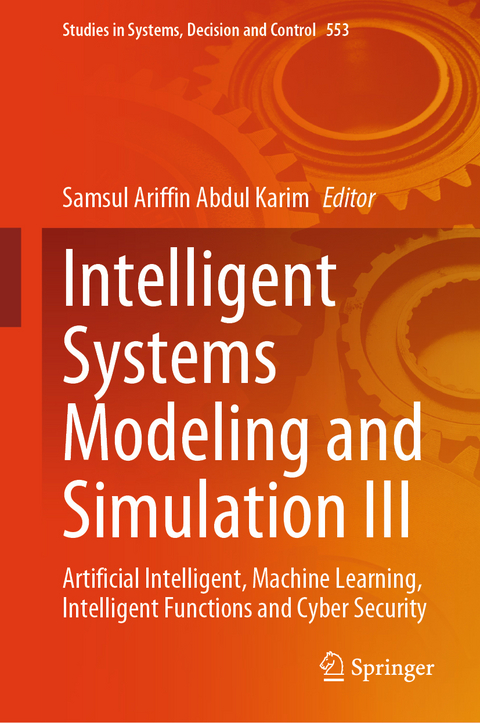
Intelligent Systems Modeling and Simulation III
Springer International Publishing (Verlag)
978-3-031-67316-0 (ISBN)
This book continues the previous edition: Samsul Ariffin Abdul Karim (2022). Intelligent Systems Modeling and Simulation II: Machine Learning, Neural Networks, Efficient Numerical Algorithm and Statistical Methods, Studies in Systems, Decision and Control (SSDC, volume 444, 22k Access). After two years, Intelligent Systems Modeling and Simulation have evolved tremendously through the latest and advanced emergence technologies and many highly sophisticated algorithms have been developed by blending artificial intelligence (AI) and mathematics, statistics, data modelling and other related research areas. These blends offer many opportunities and further investigations into the overlapand equality between these areas. It is a well-known fact that most industries and companies have utilized this IR4.0 architecture in various levels of manufacturing and decision processes. Besides, nowadays IR5.0 or Society5.0 has also been embedded into various systems in industries as well as in Teaching and Learning (TL). The combination of IR4.0 and Society 5.0 may result in more impactful outcomes, especially in automated decision-making and reliable simulations-based modelling. Furthermore, IR4.0 and Society5.0 through Data-Driven have made a significant contribution to the government and companies to analyse big data via predictive analytics. Cyber security firewalls on all systems must be up to date to prevent any malicious attacks by hackers. Otherwise, our citizens might be scammed and according to NBC News, the total loss for 2022 is around USD 8.8 billion. These are very huge amount. Just recently, COVID-19 has been spreading all over the world again. To assist the Ministry of Health (MOH) and other government agencies, it is very crucial to identify, predict, detect and quarantine the COVID-19 on the susceptible persons soonest possible. Intelligent Image Processing techniques are very demanding here. This is to ensure that we can control and minimise the spread. Inspire by these latest developments, in this book, various experts in the areas of Artificial Intelligence, Machine Learning, Deep Learning, Neural Networks, Modeling and Simulation, Cyber Security and Awareness, Intelligent Statistical Methods, Big Data Analytics, Sentiment Analytics, Intelligent Function Approximation, Image Processing in medical imaging especially on COVID-19, AI in Teaching and Learning, and Computational Intelligence will share their latest studies and experiences. Their finding is in line with United Nations Sustainable Development Goals (SDGs) such as No. 9: Industry, Innovation, and Infrastructure, particularly Target 9.4, 9.5, 9.a, 9.b and 9.c, No. 11: Sustainable Cities and Communities particularly Target 11.b and Indicators 11.b.1 and 11.b.2, and SDG No. 4: Quality Education; particularly Target 4.7 and Indicator 4.7.1. This book is highly suitable for postgraduate students and researchers to get the state-of-the-art current research directions as well as for the scientists that have an interest and working in intelligent numerical modelling and simulations through AI, Machine Learning, Neural Networks, and its related counterparts.
Samsul Ariffin Abdul Karim is an Associate Professor with School of Quantitative Sciences, UUM College of Arts & Sciences, Universiti Utara Malaysia (UUM), Malaysia. He obtained his PhD in Mathematics from Universiti Sains Malaysia (USM). He is a Professional Technologists registered with Malaysia Board of Technologists (MBOT), No. Perakuan PT21030227. His research interests include numerical analysis, machine learning, approximation theory, optimization, science, and engineering education as well as wavelets. He has published more than 180 papers in Journals and Conferences proceedings including five Edited Conferences Volume and 80 book chapters. He was the recipient of the Effective Education Delivery Award and Publication Award (Journal & Conference Paper), UTP Quality Day 2010, 2011 and 2012, respectively. He was Certified WOLFRAM Technology Associate, Mathematica Student Level. He also has published thirteen books with Springer Publishing including eight books with Studies in Systems, Decision and Control (SSDC) series, three books with Taylor and Francis/CRC Press, one book with IntechOpen and one book with UTP Press. He received Book Publication Award in UTP Quality Day 2020 for book Water Quality Index (WQI) Prediction Using Multiple Linear Fuzzy Regression: Case Study in Perak River, Malaysia, that was published by SpringerBriefs in Water Science and Technology in 2020.
Intelligent Systems Modeling and Simulation: An Overview.- COVID-19: Current Situation and Data-Driven Solutions.- Deep Learning for COVID-19 Image Detection.- Deep Learning for COVID-19 Prediction.- New Neural Network Framework for Medical Intelligent Systems.- AI in Teaching and Learning.- AI for Future Assessment.- Detection of Confusion in Online Learners.- Using Electroencephalography (EEG).- Population GrowthForecasting Using the Verhulst Logistic Model and Numerical Techniques.- AI for Climate Change Prediction.- Intelligent Approximation for climate differential equations.- AI for disaster risk reduction strategies.- AI for Environmental Modeling.- Deep Learning to Air Pollution Predictive.- Compressor Vibration Monitoring for Predictive Maintenance using Machine Learning.- Building Vibration Analysis using Machine Learning and Predictive Analytics.- Fraud Detection Using Machine Learning.- Big-Data Framework for Auditing Analytics.- Cyber Security Awareness: Concept and Technical Aspects.- Intelligent Systems Modeling and Simulation: Ways Forward from IR4.0 to IR5.0.
| Erscheinungsdatum | 24.09.2024 |
|---|---|
| Reihe/Serie | Studies in Systems, Decision and Control |
| Zusatzinfo | XVII, 521 p. 170 illus., 147 illus. in color. |
| Verlagsort | Cham |
| Sprache | englisch |
| Maße | 155 x 235 mm |
| Themenwelt | Informatik ► Theorie / Studium ► Künstliche Intelligenz / Robotik |
| Technik | |
| Schlagworte | AI in Teaching and Learning • Artificial Intelligence • Big Data Analytics • Deep learning • machine learning • Neural networks |
| ISBN-10 | 3-031-67316-6 / 3031673166 |
| ISBN-13 | 978-3-031-67316-0 / 9783031673160 |
| Zustand | Neuware |
| Haben Sie eine Frage zum Produkt? |
aus dem Bereich


